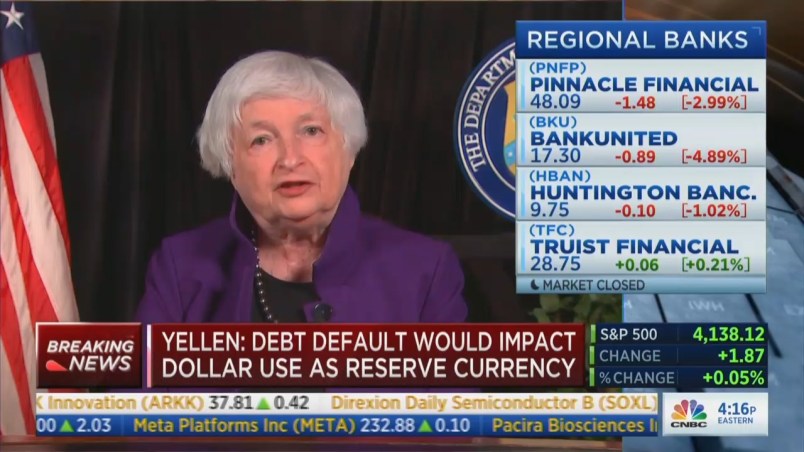We’ve had this running question for months about just what happens if the U.S. Treasury runs out of funds to meet all the government’s spending obligations. To be clear, those include ordinary spending as well as servicing of the principal of and interest on the U.S. debt. Secretary Yellen went on CNBC this afternoon and I think we got the first piece of an answer. It was a long interview, mostly about other aspects of the economy. But she discussed the debt ceiling standoff at the beginning. Here’s the key passage.
“I would say if Congress doesn’t raise the debt ceiling, the President will have to make some decisions about what to do with the resources that we do have [and] there are a variety of different options. But there are no good options. Every option is a bad option, and I really don’t want to get into discussing them and ranking them, because, as every Treasury secretary has known, the only option that leaves our economy in good shape, and our finance system, is raising the debt ceiling, making clear that Congress stands behind the basic principle that America pays its bills. We’re not a deadbeat country.”
On its face, this suggests that the government’s primary response will be to cover U.S. debt obligations but simply suspend certain categories of spending. The government can handle all debt obligations and the great majority of its spending obligations just out of tax revenues. But not all of them. What’s left is a huge amount of spending and a non-trivial amount of total GDP. So it’s a big deal.
But note here that we’ve gone from no other options to “no good options.” I don’t think that’s a change so much as a recognition that this is going to happen and an effort to prep people for just how it’s going to play out. Just what’s she’s saying here isn’t entirely clear to me. You could interpret this to mean just cutting off certain checks — spending out of tax receipts — or some mix of cuts and consol bonds, or something else. But prioritizing some spending obligations over others seems to be a major part of the plan and perhaps the whole plan.
Perhaps more than anything else, this seems like a signal that this is quite likely to happen — i.e., go past the debt ceiling limit — and we’re getting the first clues as to how it will work.






